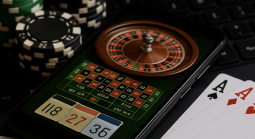Gambling Addiction and Illness Theory Gaining Ground

Liz Benston Las Vegas Sun
Experts who study gambling addiction remain a long way from knowing why people develop gambling problems. But researchers now know what happens inside the brains of gambling addicts that fuels the addiction, and how best to help them.
A growing collection of research has found that the most afflicted have the kinds of biological brain disorders that are found among drug and alcohol abusers.
Advances in understanding gambling addiction are the result of functional magnetic resonance imaging, or fMRI, which allows the brains of gambling addicts, non-addicted gamblers and nongamblers to be scanned and compared.
Before the relatively recent use of MRI machines, scientists could only view people's behavior, dissect the brains of the deceased or study brain chemistry by drawing fluid from the body. Functional magnetic resonance imaging allows real-time study of the brain by measuring changes in blood flow as well as oxygen levels in the blood.
Scanning participants' brains as they were shown various gambling-related images or while they gambled with real money revealed a remarkable symptom within the brain:
Dopamine, a chemical that regulates human behavior, including weighing relative rewards and anticipation of those rewards, flooded a part of gambling addicts' midbrains called the nucleus accumbens. The chemical rush created overstimulated feelings of interest and excitement for the addicts - a reaction that did not occur among non-addicts.
Still unknown - the elusive mystery - is why gambling stimulates dopamine in some people.
Nonetheless, the scans provided the first biological evidence of what treatment providers had long known from working with the hardest cases: For addicts, gambling becomes all-important - eclipsing commitments to family and work. Like scoring drugs and getting high for the drug addict, gambling seems critical for survival.
Economist Don Ross at the University of Alabama and the University of Cape Town, who has studied how society's reward systems influence human behavior, calls this phenomenon a "hijacking" of the brain's reward system to create intense cravings and an obsessive focus on gambling.
The brain pulls off this mutiny by figuring out that, if it can identify and connect with an addictive target - say, a slot machine - it can produce its own jackpot - a flood of rewarding dopamine. Triggering that dopamine overflow can overwhelm brain circuits that normally moderate risky behavior, said Ross, a senior economist for the National Responsible Gambling Program, a public-private partnership in South Africa that funds problem gambling research, education and treatment.
These people, Ross says, seek out gambling not for pleasure - which would be a normal reaction to an entertaining pastime - but for the dopamine rush, which in turn creates a vicious circle where the person focuses more intensely on gambling at the expense of everything else.
In Ross' studies, the dopamine rush among addicted research subjects occurred before any gambling and in response to cues indicating that gambling was about to occur, such as an image of a slot machine or the person's favorite casino. That result appears to coincide with stories of gambling addicts who - much like the alcoholic who obsesses about wanting to have a drink - are preoccupied with anticipation for gambling.
To read this story in its entirety go here













